Review: Broadway Musical Paradise Square Imagines Racial Utopia in a Notorious Slum
This epic new musical is set in New York’s Five Points neighborhood during the Civil War.
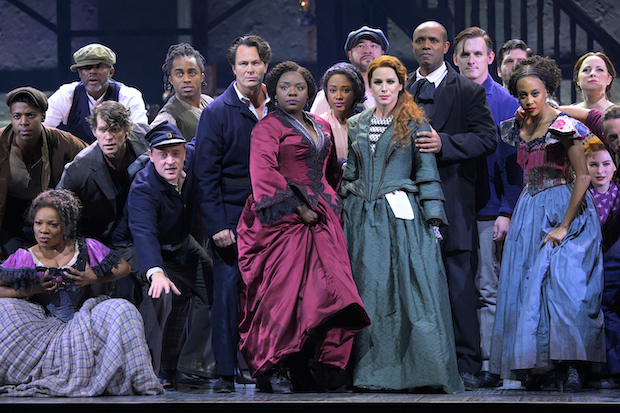
(© Kevin Berne)
I was technically married in the Five Points. Of course, New York's most infamous slum is nearly unrecognizable now, occupied by government buildings, the oldest sliver of Chinatown, and the eyesore prison where Jeffrey Epstein took his last breath. But in the years surrounding the Civil War, it was the site of wretchedly concentrated poverty as free Blacks and Irish immigrants crowded into racially integrated tenements and dance halls. It was also the laboratory of a kind of wonderful cultural alchemy. That's the subject of the new Broadway musical Paradise Square, which feels more packed than a Cow Bay flophouse.
It is set around the bar that Nelly O'Brien (Joaquina Kalukango) owns with her husband Willie (Matt Bogart), an Irish immigrant who has enlisted in the army with his buddy, Mike (Kevin Denis). Both are heading south to preserve the union, leaving the bar to the care of Nelly and Willie's sister, Annie (spunky understudy Kennedy Caughell at the performance I attended, but normally Chilina Kennedy).
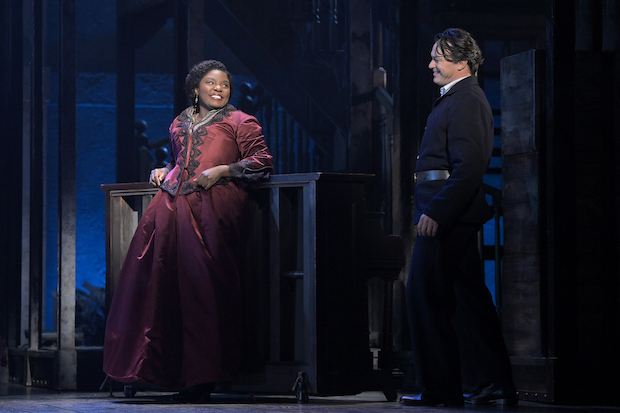
(© Kevin Berne)
Meanwhile, Annie's nephew Owen (A.J. Shively) arrives from Ireland at the same time Joah (Sidney DuPont), a formerly enslaved person, arrives via the underground railroad, on which Annie's reverend husband (Nathaniel Stampley) serves as a station master. Joah won't go on to Canada without his love, Angelina (Gabrielle McClinton), so the reverend agrees to let him stay above the bar. The only problem is, Annie has already promised that room to Owen, so they must share like a 19th-century Oscar and Felix.
Then the draft goes into effect, targeting all white men who cannot produce a replacement or $300. Cynical politician Frederic Tiggens (John Dossett) looks for a way to exploit this, and in grand NYC tradition also levies massive fines on Nelly's bar, which he dislikes for its race mixing (the establishment seems to be based on Pete Williams's dance hall at 67 Orange Street). Nelly comes up with a solution: a dance competition that will bring in booze revenue and offer one lucky winner $300. It's Gangs of New York meets Step Up with a somewhat needless C-plot involving Stephen Foster incognito (Jacob Fishel), using all of this to overcome his writer's block. It's a lot for a two-hour, 40-minute musical that takes itself very seriously.
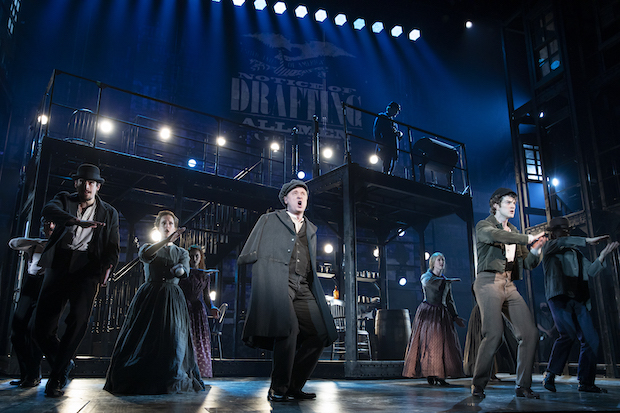
(© Julieta Cervantes)
One can at least appreciate the irony of the writers dinging the father of American music for cultural appropriation while simultaneously sampling from his songbook ("Camptown Races," "Old Folks at Home," "Angelina Baker," and "Oh! Susanna" all make appearances). It's the dramaturgical equivalent of the perfunctory land acknowledgement: Yes, someone stole this thing I'm now enjoying, and I feel bad about that, but I'm not giving it back. #SorryNotSorry.
Much of this confusion can be traced to this show's origin as another musical called Hard Times, which played off-off-Broadway in 2012. Larry Kirwan was the only writer back then of what was mostly a bio-musical about Foster's time in the Five Points. It's easy to see how the subject matter became increasingly problematic in the decade it took to bring a show like this to Broadway. New cooks entered the kitchen to fix the broth, adding ingredients and then departing: Craig Lucas and Christina Anderson are credited alongside Kirwan as book writers. Marcus Gardley was credited during the Chicago run, but has now vanished from the billing. Add to the mix pleasantly uplifting (yet mostly forgettable) new music by Jason Howland, and lyrics by Nathan Tysen and Masi Asare, and what we're left with is a stone soup musical, parts of which are still edible if you're willing to take the risk of ingesting an undissolved bouillon cube.
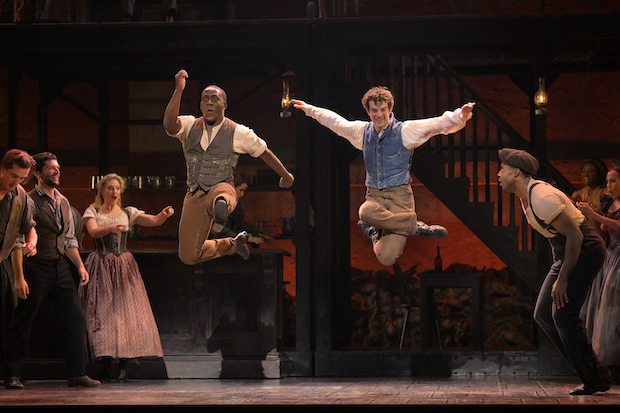
(© Kevin Berne)
One aspect of Paradise Square that does feel fresh is Bill T. Jones's expansive choreography, which melds elements of Irish step and West African dance to give a striking visual expression of the kind of cultural exchange that happened in the Five Points — all without losing Jones's own iconic gestural style. In big production numbers like "Now or Never" we see the fusion of styles and techniques as healthy competition and gleeful appropriation pushes the form forward (this is the best answer to the Stephen Foster afterschool special). The entire ensemble of excellent actors really gets into it, and it is a joy to behold.
Sadly, such moments are fleeting in director Moisés Kaufman's bleak and lurching production, encapsulated by Allen Moyer's supersize set: Its multiple levels convey the density of the Five Points, while its ever-rotating stage betrays the more is more attitude that prevails in Broadway design. Donald Holder has conscripted a regiment of LED lights, which he lines up against the upstage wall like a firing squad. Toni-Leslie James's costumes are period appropriate while allowing for movement (a must in this show). And sound designer Jon Weston achieves a nice balance, but never goes full Hollywood with the offstage noise of the 1863 Draft Riots — which seems like misplaced restraint right at the moment of climax.
Besides the dancing, the reason to see Paradise Square is Kalukango, who delivers a powerful performance as a woman trying to hold her fragile world together through what feels like the end times. She suspends the audience in awe throughout her solo numbers, "Heaven Save Our Home" and "Let It Burn." A tear streaming down her cheek, she roars to the back row, and we really do believe she could stop a rampaging mob with just the power of her voice. Unfortunately, she cannot singlehandedly save a Broadway musical suffering from an identity crisis.
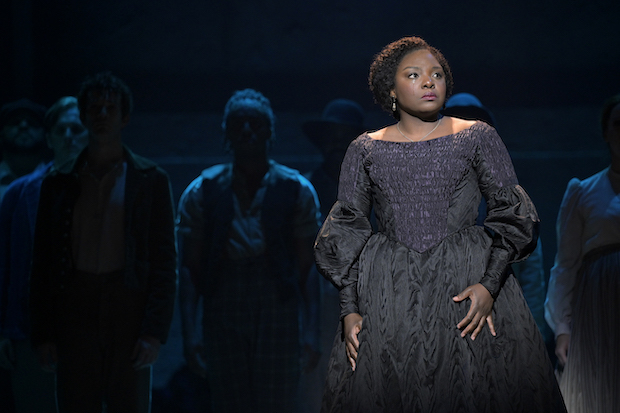
(© Kevin Berne)
With its sprawling cast, towering scenery, earnest ballads, and anthemic production numbers, Paradise Square feels like a Broadway musical from a different time — Les Misérables with banjos (the wicky-wicky guitar in Howland's orchestrations feels like an entirely different kind of throwback). This historical revisionism is almost beside the point when the fundamentals of good musical storytelling aren't there.
Is there a place on Broadway for epic historical musicals anymore? The continuing success of Hamilton suggests so, although that show benefits from a far more distinctive and confident authorial voice. And even though it wasn't a hit in its last Broadway revival, I keep hoping that someone will bring back Ragtime, a historical musical that successfully brought together its many moving parts, and which has only appreciated in value (Paradise Square lead producer Garth Drabinsky also produced that gem in 1998). Until then, we'll have to make do with the likes of Paradise Square, which (like all utopias) overpromises and underdelivers.









